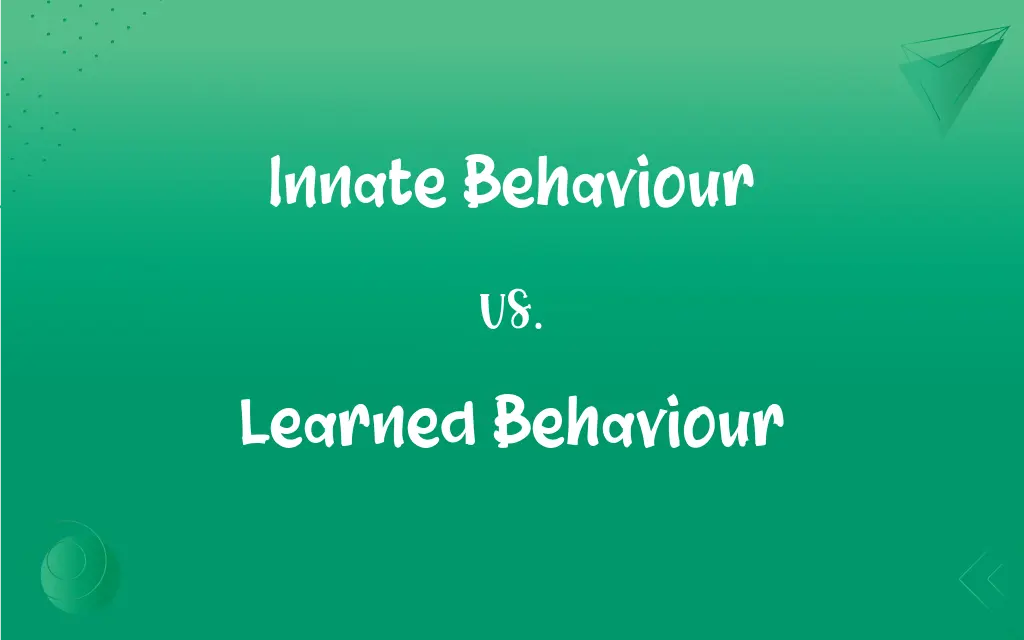Innate Behaviour vs. Learned Behaviour: What's the Difference?
Edited by Harlon Moss || By Janet White || Published on March 2, 2024
Innate behaviour is instinctual and present at birth, while learned behaviour develops through experience.

Key Differences
Innate behaviour refers to actions and reactions that organisms are born with, such as reflexes and instinctual responses. These behaviours are genetically programmed and are often essential for survival. Learned behaviour, on the other hand, is acquired through interaction with the environment and through experience. This type of behaviour involves memory and can be modified over time.
Innate behaviour is universal within a species and is predictable, given certain stimuli. For example, birds building nests or spiders spinning webs are innate behaviours that do not require teaching. Learned behaviour is highly variable and can differ greatly even among individuals of the same species, depending on their unique experiences and the skills they acquire over time.
The distinction between innate and learned behaviour highlights the interplay between genetics and environment in shaping an organism's actions. Innate behaviours are a result of evolutionary pressures that have favoured certain instinctual actions for survival, whereas learned behaviours represent the adaptability and flexibility of an organism to its changing environment.
Innate behaviour is immediate and automatic, requiring no prior experience to be executed. This immediacy is crucial for responses that need to be rapid to be effective, such as withdrawal from pain or the suckling reflex in newborns. Learned behaviour, by contrast, involves a process of trial and error, observation, and imitation, which takes time and can be refined throughout an organism's life.
Innate behaviour provides a reliable foundation for responding to the world, learned behaviour allows organisms to adapt to new challenges and opportunities. The balance between these two types of behaviour enables individuals to both react instinctively to immediate dangers and adaptively to complex, changing environments.
ADVERTISEMENT
Comparison Chart
Origin
Genetically programmed
Acquired through experience
Variability
Consistent within species
Varies widely among individuals
Change Over Time
Static, does not change
Dynamic, can evolve with new experiences
Complexity
Generally simple and fundamental
Can be highly complex and sophisticated
Examples
Reflex actions, instinctual responses
Language acquisition, playing an instrument
ADVERTISEMENT
Innate Behaviour and Learned Behaviour Definitions
Innate Behaviour
Instinctive response present from birth.
A baby reflexively grasping a finger.
Learned Behaviour
Behaviour modified by environmental influences.
A parrot learns to mimic human speech by listening and practicing.
Innate Behaviour
Biological, instinctual drives inherent at birth.
Newborns blinking reflexively when an object approaches their eyes.
Learned Behaviour
Changes in behaviour as a result of practice or experience.
A musician becoming proficient in playing an instrument through sustained practice.
Innate Behaviour
Genetically hardwired actions in an organism.
Turtles heading towards the ocean immediately after hatching.
Learned Behaviour
Knowledge or actions gained through observation and imitation.
A dancer mastering complex routines by watching and imitating instructors.
Innate Behaviour
Inborn patterns of activity or tendency.
Birds migrating seasonally without prior instruction.
Learned Behaviour
Acquired skills or knowledge through experience.
A child learns to ride a bicycle through practice.
Innate Behaviour
Natural, unlearned reactions to stimuli.
Infants sucking reflex when their lips are touched.
Learned Behaviour
Adaptive responses developed over time.
Learning to cook by following recipes and experimenting with ingredients.
FAQs
What defines learned behaviour?
Learned behaviour is acquired through interaction with the environment and through experience, not present at birth.
Can innate behaviour be influenced by environmental factors?
While innate behaviour is primarily genetic, its expression can sometimes be modified by environmental conditions.
What is an example of innate behaviour?
The reflex action of a newborn baby's grasp is an example of innate behaviour.
How do animals learn behaviours?
Animals learn behaviours through a combination of observation, imitation, trial and error, and conditioning.
Can innate behaviour change over time?
Innate behaviour generally remains consistent throughout an organism's life as it is genetically programmed.
How does learned behaviour differ among individuals?
Learned behaviour can vary widely among individuals based on their unique experiences and the skills they acquire.
Is walking an innate or learned behaviour?
Walking is considered a learned behaviour because it requires practice and coordination that is developed after birth.
How do psychologists study innate and learned behaviours?
Psychologists study these behaviours through experiments, observational studies, and comparative analyses among different species.
What is innate behaviour?
Innate behaviour is a natural, instinctual action or reaction that an organism is born with.
Are all human behaviours learned?
Not all human behaviours are learned; some, like reflex actions, are innate.
How do innate and learned behaviours interact in an organism's life?
Innate behaviours provide a foundation for survival, while learned behaviours allow for adaptation and complex interactions with the environment.
Is language an innate or learned behaviour?
Language acquisition is a learned behaviour, although the capacity for language is believed to have an innate component.
Can innate behaviours be complex?
While most innate behaviours are relatively simple and fundamental, some, like migration patterns in birds, can appear complex.
What impact does culture have on learned behaviour?
Culture significantly influences learned behaviour through social norms, language, and traditions.
What role does genetics play in learned behaviour?
Genetics can influence the capacity for learning and the predisposition towards certain learned behaviours.
Can learned behaviour become instinctual over generations?
Learned behaviours can become instinctual if they provide a survival advantage and are genetically assimilated over many generations.
Can learned behaviours be forgotten?
Yes, without practice or reinforcement, learned behaviours can be forgotten or unlearned.
Is fear an innate or learned behaviour?
Fear can be both innate, as in instinctual fears, and learned through negative experiences.
Are social behaviours innate or learned?
Social behaviours are often a mix of innate predispositions and learned experiences.
How does adaptation relate to learned behaviour?
Adaptation involves changes in learned behaviour to better suit an organism's environment, enhancing survival and reproduction chances.
About Author
Written by
Janet WhiteJanet White has been an esteemed writer and blogger for Difference Wiki. Holding a Master's degree in Science and Medical Journalism from the prestigious Boston University, she has consistently demonstrated her expertise and passion for her field. When she's not immersed in her work, Janet relishes her time exercising, delving into a good book, and cherishing moments with friends and family.
Edited by
Harlon MossHarlon is a seasoned quality moderator and accomplished content writer for Difference Wiki. An alumnus of the prestigious University of California, he earned his degree in Computer Science. Leveraging his academic background, Harlon brings a meticulous and informed perspective to his work, ensuring content accuracy and excellence.































































